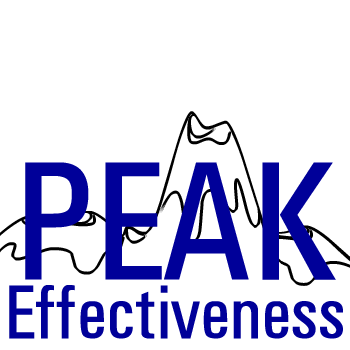






|
|
|
|
|
|
Get Engaged – At
Work and In Life!
Five Premises About Needs
- The closer a need is to the bottom of the pyramid, the more power it exerts over our actions.
- Man is forever needing
- A satisfied need is not a motivator.
- We expend money and energy to need our needs.
- To the extent that a person functions more frequently at higher levels of the pyramid he is becoming more human, further along in the process of growth and maturity.
Understanding that all people have the same set of needs gives us insight into why a person behaves the way he or she does.
Needs are evidenced by feelings. Needs talk to us as feelings. Maslow said, "a feeling which, if left unsatisfied, produces anxiety or tension ... yet if satisfied, imparts a sensation of well-being". These feelings tell us if there is a difference between how we want to feel and how we do feel, i.e., whether or not we've got a problem. I can be motivated by either trying to gain a good feeling or avoid a bad one (in other words, maintain a good feeling). The contrast between what we want and what we have is what motivates us. The contrast is the problem. The more the contrast, the stronger the motivation.
We have talked about our role as being problem solvers for our target audience. Part of our job as internet marketers therefore is to clarify for our web site visitors how unpleasant his present situation is and make him anticipate as much as possible the enjoyment he will have when he reaches the desired goal. Or acknowledge that the visitors' current position is ok, but how much better, easier or whatever it could be if he or she took advantage of the product or service we are offering. We need to paint the contrast in black and white.
Since needs talk to us in terms of feelings, the difference, the problem, also talks to us in terms of feelings. Unsatisfied needs create bad feelings, which may be lumped into the term "tension". Good feelings can be called "satisfaction". After a person feels enough bad feelings, enough tension, he is motivated to behave in a way to reduce the tension. The bad feelings, whether they be pain, fear, anxiety, fever, sadness, jealousy, hate, anger, frustration or disappointment, make us want to find a solution that will treat the cause of that tension, and return us to the feeling of satisfaction or well-being.
Therefore motivation starts with a need, which if unsatisfied, creates tension. In order to solve the problem, to reduce the tension, we must usually discover what is responsible or what is causing the situation in which there is a difference between what we need and what we have. Once we find the cause, it usually is quite easy to find and implement the solution that will treat the cause, solve the problem and thus, satisfy the need feeling.
| PRIMARY NEEDS | Examples of feelings resulting from satisfied need (to be gained) | Examples of feelings resulting from unsatisfied needs (to be avoided) |
| Physiological | recreation, recuperation, joy, playful, full, satiated, convenience, alert, healthy, warm, strong, comfortable, pleasure, rested, ease, excitement, fun energetic | hunger, thirst, drowsy, fever, sick, inconvenience, weak, hot, cold, discomfort, weary, pain, tired |
| Safety | security, safety, assurance, familiarity, peace of mind, serenity, harmony, certainty, stability, order, openness | trapped, confused, pushed, doubtful, worried, danger, loss, disorder, insecurity, fear, chaos, anxiety, anguish, threatened, guarded |
| Love | acceptance, belonging, supported, relationship, understanding, popularity, friendship, attention, intimacy, compliment, involvement | rejected, loneliness, neglected, excluded, isolated, criticized, misunderstood, disapproval, rebuked |
| Self-esteem | pride, successful, prestige, honor, glory, victory, regard, confidence, respect, mastery, recognition, credit, accomplishment, hero, competence | failure, blame, defeat, shame, inadequacy, humiliation, disrespect, guilt, insignificance, ignorance, dishonor, goat, inadequate, depressed, embarrassment |
| Self-actualization | creativity, growth, maturity, openness, independence, curious, sensitive, flexibility, spontaneous, altruism, realistic awareness, determined, freedom | boredom, selfishness, uselessness, defensiveness, inhibition, inflexibility, dependence, immaturity, deficiency, stifled, indifferent |
These five basic needs that were identified by Dr. Maslow have been regrouped somewhat but essentially adopted by Stephen Covey in his books, where he says that we all want to: Live, love, learn and leave a legacy.